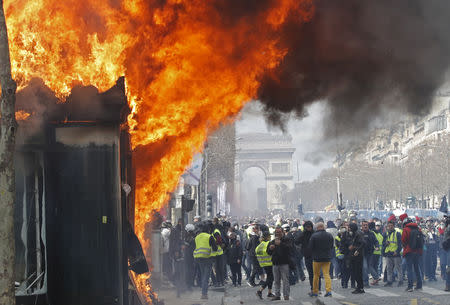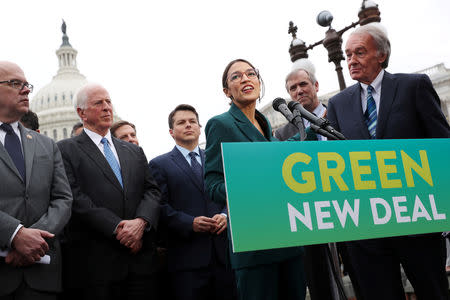Valid or voodoo? Monetary theory may appeal in Europe's 'age of rage'
By Julien Ponthus, Tommy Wilkes and Ritvik Carvalho
LONDON (Reuters) - Having spent three years and more than 2.6 trillion euros (£2.2 trillion) trying to boost economic growth across the euro zone, the European Central Bank's mixed record may open the door for a high-spending, radical alternative.
With populist and anti-austerity parties looking to build support before European parliamentary elections in May just as growth withers, so-called Modern Monetary Theory (MMT) is challenging conventional thinking on debt, deficits and how economies should be run.
Popularised by Alexandria Ocasio-Cortez, a rising star of the American left, MMT posits in essence that a country with the ability to print its own currency can create and spend money freely, so long as inflation is kept under control.
The country can't be forced into defaulting on its debts since it can always print money to pay creditors, the theory runs.
It's music to the ears of European populists demanding a ramp-up in public spending to fight unemployment and finance social programmes. Years of central bank quantitative easing (QE), they say, have done little except inflate financial asset prices.
MMT is about financing government spending and the real economy, its advocates say, while QE is solely designed to stimulate financial markets through massive purchases of private and public bonds on the secondary market.
MMT is unlikely to be put into practice in the euro zone any time soon. Rules of the currency area make it impossible for member states to print money unilaterally, and mainstream policymakers have derided the economics behind it.
Former U.S. Treasury Secretary Larry Summers has called MMT "voodoo" thinking.
But the ideas underpinning the theory are helping shape an ideological push against European fiscal orthodoxy and policymakers' reluctance to consider big public debt-funded investment schemes.
"Post-European elections, there will be much more talk at a European level of (fiscal) spending and stimulus," John Roe, a fund manager at Legal & General Investment Management, Britain's biggest asset manager, told Reuters.
NEW DEAL
Roe noted calls for a vast publicly funded "Green New Deal", as touted by some left-wing U.S. Democrats, are yet to materialise in Europe. But demands for such a policy remain a possibility which investors should take seriously.
The ECB's admission this month that QE had failed to lift inflation and economic growth, and that it would leave interest rates at rock-bottom until at least 2020, leaves it vulnerable to calls for a drastic rethink.
"Real-world Modern Monetary Theory, defined as the monetization of large public deficits by the central bank, would be most advisable in the euro zone," even if close to impossible to implement in the bloc, said Vincent Deluard, an analyst at financial advisory firm INTL FCStone.
(Graphic: Euro zone growth and inflation - https://tmsnrt.rs/2UwLSzu)
POPULIST ROUTE
With talk of Europe slipping into a spiral of "Japanification", a combination of weak growth and low inflation, pressure is building for fresh policy approaches, although advocates of MMT are yet to appear in European discourse as frequently as they have in the United States.
That could be about to change.
"People are assuming that if there's a continued European economic slowdown after the European elections, European politicians will say Europe needs more infrastructure and they think they can print money at no extra cost", said Saxo Bank's chief investment officer Steen Jakobsen.
There have already been some moves towards an MMT-type approach.
British opposition leader Jeremy Corbyn in 2015 proposed "people's QE", a government-directed central bank-financed scheme to fund infrastructure.
More recently, Italy's ruling parties have been in a standoff with Brussels over their desire to end an EU-imposed fiscal straitjacket and spend more to revive a struggling economy.
French President Emmanuel Macron has beefed up public spending to defuse violent "yellow vest" street protests.
In a research note titled "The age of rage, what populism means for markets", Rabobank market strategist Michael Every said investors should expect populist parties to use MMT to bolster their calls for higher public spending.
Markets should "to prepare for a far higher risk of truly paradigmatic shifts ahead", Every warned.
ECONOMIC COLLAPSE
Little of this means much unless politicians ready to rip up the macroeconomic rulebook can make it into office. And the financial establishment is unsurprisingly near universal in its condemnation.
They argue that governments let loose to print money can set off a spiral into hyperinflation and economic collapse.
"The general idea that government debt can be financed by central banks is a dangerous proposition", ECB chief economist Peter Praet said in a recent online Q&A.
"In the past, this has resulted in hyperinflation and economic turmoil", Praet said, adding: "That's why central banks are independent".
A poll http://www.igmchicago.org/surveys/modern-monetary-theory conducted by the University of Chicago Booth School of Business found that 88 percent of economic experts disagreed with the idea that countries able to borrow in their own currencies need not worry about government deficits because they can always print money to finance their debts.
(Graphic: MMT poll - https://tmsnrt.rs/2UAFmHZ)
Bank of Japan Governor Haruhiko Kuroda, a fiscal hawk, has also slammed MMT, calling it an "extreme argument that won't be accepted widely."
UNLIKELY EVENTS
The debates around MMT might seem unlikely to rouse the average European, but interest is growing - "MMT" is a more searched term on Google than "ECB".
(Graphic: Web search interest for "Modern Monetary Theory" - https://tmsnrt.rs/2O4KOAd.)
In a newsletter, East West Investment Management analyst Kevin Muir noted widespread anger among electorates in leading economies, arguing: "Monetary stimulus with fiscal austerity doesn’t do anything except make the rich richer."
And while MMT might sound like a political and economic fantasy, some economists warn against discounting the momentum of populist waves: Britain's vote to leave the EU and the election of Donald Trump had both been viewed as improbable.
Societe Generale analyst Albert Edwards believes that the next recession is likely to see the normalisation of ideas such as the "People's QE" proposed by Britain's Corbyn, where money "just doesn't get thrown (like) ... confetti in the financial markets but is actually channelled into tax cuts or into public investment projects".
(Additional reporting by Josephine Mason, Karin Strohecker, Helen Reid and Abhinav Ramnarayan; Editing by David Holmes)

 Yahoo News
Yahoo News 

